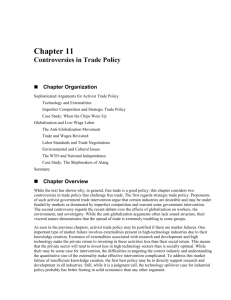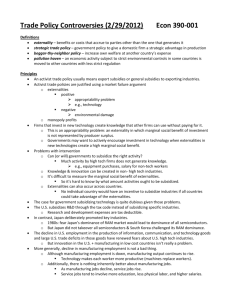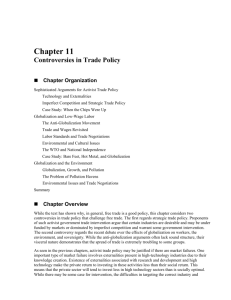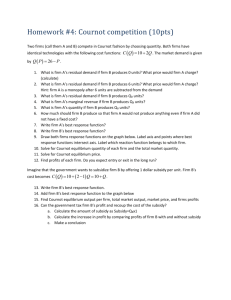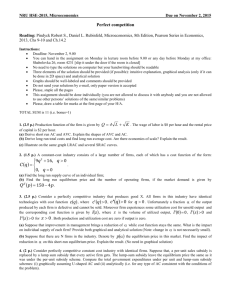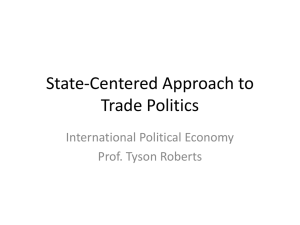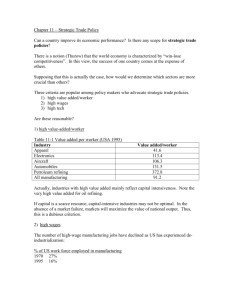Solutions to chapter 11 problems
advertisement
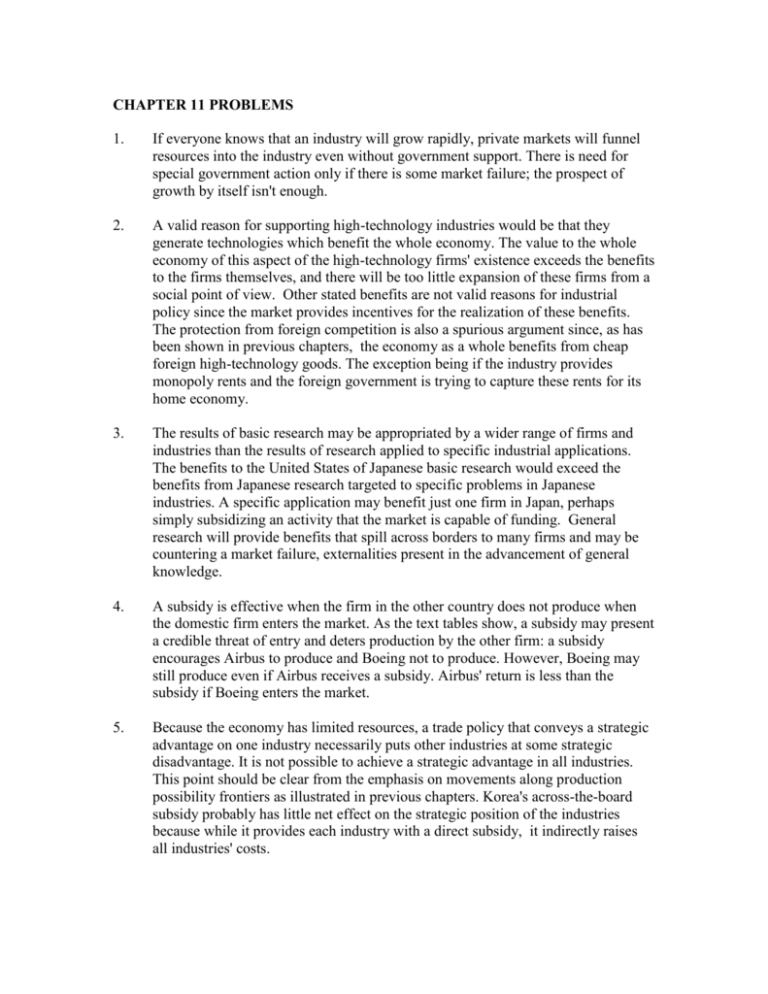
CHAPTER 11 PROBLEMS 1. If everyone knows that an industry will grow rapidly, private markets will funnel resources into the industry even without government support. There is need for special government action only if there is some market failure; the prospect of growth by itself isn't enough. 2. A valid reason for supporting high-technology industries would be that they generate technologies which benefit the whole economy. The value to the whole economy of this aspect of the high-technology firms' existence exceeds the benefits to the firms themselves, and there will be too little expansion of these firms from a social point of view. Other stated benefits are not valid reasons for industrial policy since the market provides incentives for the realization of these benefits. The protection from foreign competition is also a spurious argument since, as has been shown in previous chapters, the economy as a whole benefits from cheap foreign high-technology goods. The exception being if the industry provides monopoly rents and the foreign government is trying to capture these rents for its home economy. 3. The results of basic research may be appropriated by a wider range of firms and industries than the results of research applied to specific industrial applications. The benefits to the United States of Japanese basic research would exceed the benefits from Japanese research targeted to specific problems in Japanese industries. A specific application may benefit just one firm in Japan, perhaps simply subsidizing an activity that the market is capable of funding. General research will provide benefits that spill across borders to many firms and may be countering a market failure, externalities present in the advancement of general knowledge. 4. A subsidy is effective when the firm in the other country does not produce when the domestic firm enters the market. As the text tables show, a subsidy may present a credible threat of entry and deters production by the other firm: a subsidy encourages Airbus to produce and Boeing not to produce. However, Boeing may still produce even if Airbus receives a subsidy. Airbus' return is less than the subsidy if Boeing enters the market. 5. Because the economy has limited resources, a trade policy that conveys a strategic advantage on one industry necessarily puts other industries at some strategic disadvantage. It is not possible to achieve a strategic advantage in all industries. This point should be clear from the emphasis on movements along production possibility frontiers as illustrated in previous chapters. Korea's across-the-board subsidy probably has little net effect on the strategic position of the industries because while it provides each industry with a direct subsidy, it indirectly raises all industries' costs. 6. The potential gains for the high technology industries depend on the extent to which a great deal of government sponsored research and development is filtered through the military budget. This is especially relevant when military expenditures on research and development have spillover effects and produce a marginal social gains of knowledge which benefit other firms in U.S. industry. However, there are several caveats to this argument. To the extent that military industry is particularly concentrated and oligopolistic, there may be a serious market failure. More importantly, there remains the issue of how relevant and applicable will be any knowledge spillovers from military research and development to the high technology sectors. Moreover, the military fields may be siphoning off many highly talented researchers from civilian high-technology industries. Much of it may not be well-suited. In this case, the goal of developing a broad application to high technology through military research would not be a well-targeted program. 7. A primary argument must be that there is some sort of market failure that voids the standard logic of free trade. One might argue that Microsoft’s’ monopoly position allows it to capture excessive profits, and that its market power dissuades entry. A state-sponsored firm might be able to over-come these entry costs. Furthermore, the software industry may have numerous knowledge spillovers with other industries and high-tech applications that make it desirable to have some local presence even if the local industry loses money. On the other hand, Microsoft may be a natural monopoly. It is much easier for the world to have one computer standard. Furthermore, state direction of an industry where innovation is so important is unlikely to be successful. Finally, in software, physical location may be of minor importance as ancillary industries could develop anywhere and use modern telecommunications technology to interact with U.S. based software firms. 8. The French may be following an active nationalist cultural policy as an economic or strategic trade policy to the extent that cultural activities, such as art, music, fashion, and cuisine, are linked to other French major industries. Indeed, the fashion industry is tied to the huge textile industry, as well as to the retail sector and advertising services. One could argue that the promotion of fashion, art, and music will benefit both tourism, and these large strategic trade sectors of the French economy. However, the existence of market failures is not clearly documented in the cultural sector except to the extent that there are other less tangible externalities. Furthermore, the cultural promotions are not, in economic terms, the first best approach to supporting larger industries.
